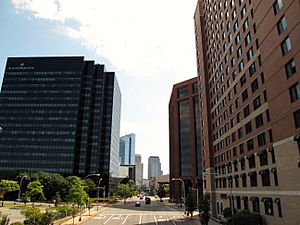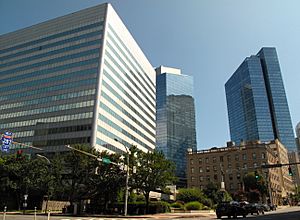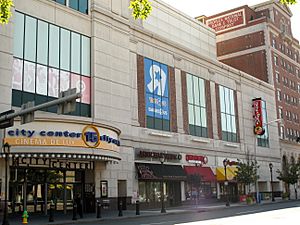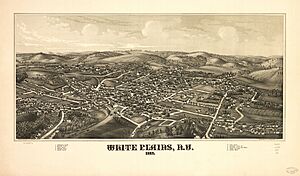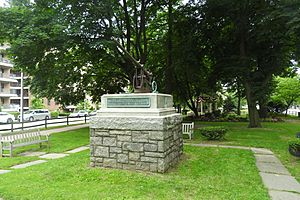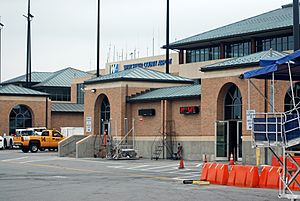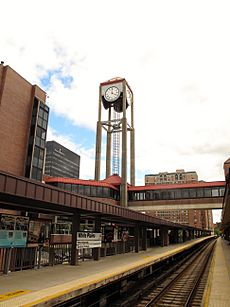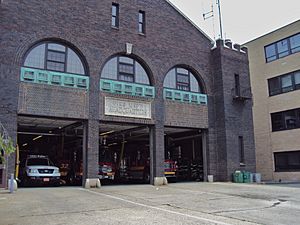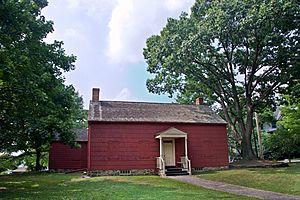White Plains, New York facts for kids
Quick facts for kids
White Plains, New York
|
|||
|---|---|---|---|
|
City
|
|||
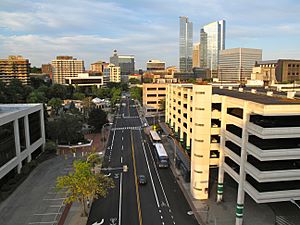
The White Plains skyline
|
|||
|
|||
| Nickname(s):
The Birthplace of New York State
|
|||
| Motto(s):
Latin: Semper Fidelis (Always Faithful)
|
|||
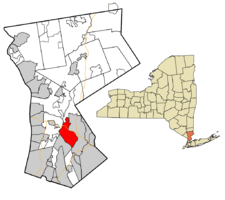
Location of White Plains within Westchester County
|
|||
| Country | United States | ||
| State | New York | ||
| County | Westchester | ||
| Settled | 1683 | ||
| Incorporated (village) | 1866 | ||
| Incorporated (city) | 1916 | ||
| Government | |||
| • Type | Mayor-council | ||
| Area | |||
| • Total | 9.86 sq mi (25.54 km2) | ||
| • Land | 9.74 sq mi (25.22 km2) | ||
| • Water | 0.12 sq mi (0.32 km2) | ||
| Elevation | 213 ft (65 m) | ||
| Population
(2020)
|
|||
| • Total | 59,559 | ||
| • Density | 6,116.77/sq mi (2,361.77/km2) | ||
| • Daytime population | 250,000 | ||
| Time zone | UTC−5 (Eastern) | ||
| • Summer (DST) | UTC−4 (Eastern) | ||
| ZIP Codes |
10600–10699
|
||
| Area code(s) | 914 | ||
| FIPS code | 36-81677 | ||
| GNIS feature ID | 0977432 | ||
White Plains is a city in Westchester County, New York, in the United States. It is the main city of Westchester County. White Plains is close to New York City, about 25 miles (40 km) north of Midtown Manhattan.
In 2020, about 59,599 people lived in White Plains. During weekdays, the city government estimates that about 250,000 people are in the city for work or other activities.
Contents
History of White Plains
Early Beginnings
Long ago, in the early 1600s, the land where White Plains now stands was used by the Weckquaeskeck tribe for farming. They called the area "Quarropas." Traders knew it as "the White Plains." This name might have come from white balsam plants or from a thick mist that often covered the swampy areas near the Bronx River.
The first non-native settlers arrived in November 1683. They were Connecticut Puritans who bought about 4,400 acres (18 km2) of land. However, there was a dispute over who owned the land. This was finally settled in 1721 when King George II granted a special document for White Plains.
In 1758, White Plains became the main government center for Westchester County. Before this, the government was in West Chester, which is now part of the Bronx. White Plains was part of the Town of Rye until 1788, when it became its own town.
The American Revolution
A very important event happened in White Plains during the American Revolutionary War. On July 9, 1776, a copy of the Declaration of Independence arrived. It was brought to the New York Provincial Congress, which was meeting in the county courthouse. The leaders quickly agreed to the Declaration. This meant New York was declaring its independence and forming the State of New York. The Declaration was first read to the public from the courthouse steps on July 11.
In September and October 1776, George Washington and his troops were in the hills of White Plains. They were being chased by British soldiers led by General Sir William Howe. On October 28, the Battle of White Plains took place. It happened mostly on Chatterton Hill, which is now west of the downtown area.
General Howe's army had 4,000–6,000 British and Hessian soldiers. They attacked three times before the American soldiers, about 1,600 strong, had to retreat. The Americans joined Washington's main army, which did not fight in this battle. The British lost about 250 soldiers, while the Americans lost about 125. Howe did not chase the Americans. After a few small fights, Howe left White Plains on November 5.
Growth of the City
The first official count of people in the United States happened in 1790. White Plains had 505 people then. By 1870, after the New York Central Railroad arrived, the population grew to 2,630. In 1866, White Plains became a village, and in 1916, it officially became a city.
Modern White Plains
After World War II, downtown White Plains became a popular shopping area. Many famous New York stores opened branches here. Some of these were the first big suburban stores in the United States. Macy's opened a large store in 1949. Other well-known stores like Saks Fifth Avenue and Lord & Taylor followed. New roads built nearby made it easy for shoppers to come from other areas.
In the late 1960s, White Plains started a big plan to rebuild its downtown. This plan involved tearing down old buildings and putting up new ones. By 1978, new buildings included the Westchester County Courthouse (1974), the Westchester One office building (1975), and the Galleria at White Plains mall (1978). Westchester One was the largest office building between New York City and Albany at that time.
Starting in the 1950s, many large companies moved their offices from New York City to White Plains. These included General Foods, PepsiCo, IBM, and Nestlé. In the 1980s, many big companies had offices in the area. However, in the 1990s, some companies reduced their operations or left.
White Plains is home to the Arts Exchange Building. This building is the main office for the Westchester Arts Council. Since 1999, artists and new cultural groups have had studios and offices there. It is a historic building.
The Galleria mall helped bring new stores and offices downtown. But by the early 1990s, growth slowed down. Many department stores closed. The B. Altman store closed in 1989. In its place, The Westchester, a fancy mall, opened in 1995. It has stores like Nordstrom and Neiman Marcus.
A new courthouse for the Southern District of New York opened in 1998. Many old office buildings were updated for smaller businesses. The old Macy's store was torn down to build the huge City Center at White Plains complex. This complex has two tall apartment towers, shops, restaurants, and entertainment.
Since 2000, more apartment buildings have been built, and the city's population has grown. White Plains is only 31 minutes by express train from Midtown Manhattan. This makes it a good place for people who work in New York City to live. In 2004, a large shopping area called The Source at White Plains opened. In 2007, the luxury Ritz-Carlton hotel was completed.
Geography and Climate
Location and Surroundings
White Plains is surrounded by other towns. To the north is North Castle. To the north and east is Harrison. To the south is Scarsdale. To the west is Greenburgh. The city is about 7 miles (11 km) east of the Hudson River and 7 miles (11 km) northwest of the Long Island Sound. White Plains has a land area of about 9.77 square miles (25.3 km2).
Weather Patterns
White Plains has a humid continental climate, meaning it has four clear seasons. Winters are cold and wet, with some snow. Summers are hot and humid. Spring and fall usually have mild and comfortable temperatures. It rains a lot throughout the year. The city gets about 229 clear or partly cloudy days each year. July is usually the sunniest month.
The coldest temperature ever recorded in White Plains was −10 °F (−23 °C) on January 19, 1977. The hottest was 102 °F (39 °C) on July 6, 2010. Each year, there are about 18 days when the temperature reaches at least 90 °F (32 °C). There are also about seven days when the temperature stays below freezing.
| Climate data for White Plains (Westchester County Airport), 1991–2020 normals, extremes 1948–present | |||||||||||||
|---|---|---|---|---|---|---|---|---|---|---|---|---|---|
| Month | Jan | Feb | Mar | Apr | May | Jun | Jul | Aug | Sep | Oct | Nov | Dec | Year |
| Record high °F (°C) | 70 (21) |
77 (25) |
82 (28) |
92 (33) |
96 (36) |
98 (37) |
102 (39) |
101 (38) |
100 (38) |
90 (32) |
78 (26) |
75 (24) |
102 (39) |
| Mean daily maximum °F (°C) | 37.3 (2.9) |
40.1 (4.5) |
47.6 (8.7) |
59.2 (15.1) |
69.2 (20.7) |
78.0 (25.6) |
83.2 (28.4) |
81.2 (27.3) |
74.2 (23.4) |
63.0 (17.2) |
52.2 (11.2) |
42.3 (5.7) |
60.6 (15.9) |
| Daily mean °F (°C) | 29.8 (−1.2) |
31.9 (−0.1) |
39.1 (3.9) |
49.6 (9.8) |
59.5 (15.3) |
68.6 (20.3) |
74.0 (23.3) |
72.4 (22.4) |
65.4 (18.6) |
54.2 (12.3) |
44.2 (6.8) |
35.1 (1.7) |
52.0 (11.1) |
| Mean daily minimum °F (°C) | 22.4 (−5.3) |
23.7 (−4.6) |
30.5 (−0.8) |
40.1 (4.5) |
49.8 (9.9) |
59.1 (15.1) |
64.9 (18.3) |
63.6 (17.6) |
56.7 (13.7) |
45.5 (7.5) |
36.2 (2.3) |
28.0 (−2.2) |
43.4 (6.3) |
| Record low °F (°C) | −10 (−23) |
−10 (−23) |
−6 (−21) |
16 (−9) |
32 (0) |
39 (4) |
46 (8) |
41 (5) |
32 (0) |
24 (−4) |
11 (−12) |
−5 (−21) |
−10 (−23) |
| Average precipitation inches (mm) | 3.20 (81) |
2.53 (64) |
4.11 (104) |
4.20 (107) |
3.94 (100) |
4.25 (108) |
4.07 (103) |
4.36 (111) |
4.94 (125) |
4.33 (110) |
3.64 (92) |
4.18 (106) |
47.75 (1,213) |
| Average snowfall inches (cm) | 7.7 (20) |
8.3 (21) |
4.9 (12) |
1.2 (3.0) |
0.0 (0.0) |
0.0 (0.0) |
0.0 (0.0) |
0.0 (0.0) |
0.0 (0.0) |
0.0 (0.0) |
0.4 (1.0) |
5.2 (13) |
27.7 (70) |
| Average precipitation days (≥ 0.01 in) | 9.5 | 8.9 | 10.5 | 11.1 | 12.2 | 10.8 | 9.8 | 10.5 | 9.8 | 10.4 | 9.8 | 11.1 | 124.4 |
| Average snowy days (≥ 0.1 in) | 3.6 | 2.4 | 1.8 | 0.3 | 0.0 | 0.0 | 0.0 | 0.0 | 0.0 | 0.0 | 0.3 | 2.3 | 10.7 |
| Source: NOAA (snow 1981–2010) | |||||||||||||
Tallest Buildings in White Plains
White Plains has several tall buildings that shape its skyline. Here are some of the tallest:
| Rank | Building | Height | Floors | Built | |
|---|---|---|---|---|---|
| 1 | The Residences at the Ritz Carlton, Westchester – North Tower | 484 ft (148 m) | 44 | 2008 | |
| 2 | The Residences at the Ritz-Carlton, Westchester – South Tower | 484 ft (148 m) | 44 | 2008 | |
| 3 (tie) | One City Place | 354 ft (108 m) | 35 | 2004 | |
| 3 (tie) | The Tower at City Place | 354 ft (108 m) | 35 | 2005 | |
| 5 | Westchester County Courthouse | 271 ft (83 m) | 19 | 1974 | |
| 6 | Gateway Building | 250 ft (76 m) | 18 | 1985 | |
| 7 | 25 Bank Street | 227 ft (69 m) | 22 | 2003 | |
| 8 | 15 Bank Street | 217 ft (66 m) | 21 | 2003 | |
| 9 | Clarence D. Rappleyea Building | 210 ft (64 m) | 17 | 1981 | |
| 10 | Westchester One | 202 ft (62 m) | 21 | 1976 |
Neighborhoods to Explore
White Plains has 35 different neighborhoods. Each one has its own unique feel!
- Battle Hill
- Bryant Gardens
- Carhart
- Colonial Corners
- Downtown White Plains
- East White Plains
- Eastview
- Ferris Avenue
- Fisher Hill
- Fulton Street
- Gedney Farms
- Gedney Manor
- Gedney Meadows
- Gedney Park
- Green Acres
- Haviland Manor
- Highlands
- Holbrooke
- Idle Forest
- North Broadway
- North Street
- North White Plains
- Dekalb
- Old Mamaroneck Road
- Prospect Park
- Reynal Park
- Ridgeway
- Rocky Dell
- Rosedale
- Saxon Woods
- Secor Gardens
- Westminster Ridge
- Winbrook
- Woodcrest Heights
Parks and Fun Activities
White Plains offers many places for outdoor fun and recreation:
- Ebersole Ice Rink: A great place for ice skating.
- Maple Moor Golf Course: For those who enjoy golf.
- Saxon Woods Park: This large park has trails, a golf course, a miniature golf course, and the biggest swimming pool in Westchester.
- Silver Lake Preserve: A natural area to explore.
- Westchester Golf Range: Practice your golf swing here.
Private Clubs
- Knollwood Country Club
- Metropolis Country Club
- Westchester Hills Golf Club
Economy and Businesses
White Plains is a hub for many large companies. Some of the major businesses based here include ITT, Xylem, Bunge, and Combe. Other important companies are PURE Insurance, Dannon, the New York Power Authority, New York-Presbyterian Hospital, and the U.S. headquarters of Heineken International.
White Plains continues to attract both national and international companies.
Education in White Plains
Public Schools
The White Plains Public School System serves over 6,000 students. It has five elementary schools (grades K–5), two middle schools (Eastview for grade 6, Highlands for grades 7–8), and one high school (grades 9–12). The district also has programs for pre-kindergarten, adult education, and students at New York-Presbyterian Hospital.
Since 1988, parents of elementary school children can choose which school their child attends. This choice is based on the school's focus, not just how close it is to home. Each elementary school has a different focus, such as science, technology, or global understanding. Two schools offer bilingual education in English and Spanish.
White Plains High School was built in the late 1950s on a 72-acre (29 ha) campus. It serves students in grades 9–12. The school has a swimming pool and a football field. The White Plains Recreation Department also works with the schools to offer many programs.
A Board of Education with seven members manages the school district. They are elected for three-year terms. A school superintendent leads the district and reports to the Board.
Private Schools
- Archbishop Stepinac High School: An all-boys Catholic high school.
- Our Lady of Sorrows Elementary School.
- German School New York.
- Solomon Schechter School of Westchester Lower School (Grades K-5).
- Windward School: This school helps children with language-based learning challenges.
Colleges and Universities
White Plains is home to several colleges and universities:
- Fordham University Westchester Campus: Offers graduate programs in business, education, and social service.
- Pace University: Its School of Law is located in White Plains. This campus used to be Good Counsel College.
- The College of Westchester: Formerly known as the Westchester Business Institute.
- Mercy College.
Population and People
| Historical population | |||
|---|---|---|---|
| Census | Pop. | %± | |
| 1880 | 2,381 | — | |
| 1890 | 4,042 | 69.8% | |
| 1900 | 7,899 | 95.4% | |
| 1910 | 15,045 | 90.5% | |
| 1920 | 21,031 | 39.8% | |
| 1930 | 35,830 | 70.4% | |
| 1940 | 40,327 | 12.6% | |
| 1950 | 43,366 | 7.5% | |
| 1960 | 50,485 | 16.4% | |
| 1970 | 50,346 | −0.3% | |
| 1980 | 46,999 | −6.6% | |
| 1990 | 48,718 | 3.7% | |
| 2000 | 53,077 | 8.9% | |
| 2010 | 56,853 | 7.1% | |
| 2020 | 59,559 | 4.8% | |
| U.S. Decennial Census | |||
In 2020, White Plains had 59,559 residents. The population is diverse, with people from many different backgrounds. About 46.4% of residents were white, 11.9% Black, and 8% Asian. About 32.4% of the population was Hispanic or Latino.
In 2010, Businessweek Magazine called White Plains one of the fastest-growing cities in the United States.
Culture and Fun
White Plains in Movies
Many popular movies and TV shows have been filmed in White Plains. Some examples include The Departed, Across The Universe, and Eighth Grade. The animated TV show Big Mouth also features a basketball game against the White Plains Tigers.
Performing Arts Scene
The White Plains Performing Arts Center is a place where you can see Broadway shows and concerts. It can hold up to 410 people.
White Plains is also home to the Westchester Philharmonic. This is the only professional symphony orchestra in Westchester County. They perform at SUNY Purchase's Performing Arts Center.
Things to Do
The White Plains Farmers' Market is open all year. From May to November, it's downtown. The rest of the year, it's at the Westchester County Center. You can buy fresh food and often enjoy live music there.
Sports Teams
White Plains is home to the United States Tennis Association USTA B team.
The Westchester County Center is where the Westchester Knicks play. They are a basketball team in the NBA G League. The New York Liberty of the Women's National Basketball Association also played there from 2018 to 2020.
The city also has rugby league teams: the White Plains Wombats and the New York Freedom.
Nightlife for Teens
White Plains has a lively nightlife, especially around Mamaroneck Avenue. This area offers many places for young people to hang out and have fun.
Getting Around White Plains
Major Roads
The Cross-Westchester Expressway, also known as I-287, goes through White Plains. It connects Tarrytown to Rye. This highway helps people travel easily to other parts of New York and nearby states. There are ongoing projects to improve the highway with new lanes and walkways.
Air Travel
Westchester County Airport is in Harrison, about 7 miles (11 km) northeast of downtown White Plains. Many people call it "White Plains Airport." It has flights to several places in Florida and even to the Bahamas. Two other major New York City airports are also less than an hour's drive away.
Train Service
White Plains has two Metro-North Railroad train stations: the White Plains station and the North White Plains station. These stations offer daily train service to Grand Central Terminal in Midtown Manhattan. Both stations are on the Harlem Line.
Bus System
The Bee Line is Westchester County's public bus service. Many routes go through White Plains, connecting to nearby towns. Some routes even go to the Bronx and connect with the New York City subway. The main bus station in White Plains is the Trans-Center, next to the Metro-North train station. Other bus services also connect White Plains to places like Rockland County and Stamford, Connecticut.
Fire Department
The City of White Plains Fire Bureau protects the city. It is part of the Department of Public Safety. This fire department is the seventh-largest in New York State. It has five fire stations across the city. They operate five fire engines, three ladders, and other special vehicles.
Local News
The Journal News is the main daily newspaper for the Lower Hudson Valley region. Its main office is in White Plains. This newspaper was created in 1998 when eleven local papers merged.
Historic Places to Visit
- Jacob Purdy House (1721): This house was used by General George Washington as his headquarters in 1778 and possibly in 1776 during the Battle of White Plains. It has been repaired and restored over the years.
- Elijah Miller House (1738): Another historic home in North White Plains. General George Washington stayed here three times, especially as a command post during the Battle of White Plains.
- White Plains Armory (1910): This building stands where the first Westchester County Courthouse was. A monument outside remembers the first public reading of the Declaration of Independence in New York on July 11, 1776.
- White Plains Rural Cemetery: This cemetery has been in use since 1797. Its office is in what was the first Methodist Church in White Plains (built in 1795).
- Percy Grainger Home and Studio: The home of composer Percy Grainger from 1921 until his death in 1961. It is now a museum.
- Other historic places listed on the National Register of Historic Places include the Bar Building, Good Counsel Complex, and Woman's Club of White Plains.
Famous People from White Plains
(b) means the person was born in White Plains.
- Katrina Adams: Former professional tennis player.
- Carolyn Bessette-Kennedy: Wife of John F. Kennedy, Jr. (b)
- Hikaru Nakamura: Five-time United States Chess Champion.
- Brian Burton (Danger Mouse): Musician and producer. (b)
- Joseph Campbell: Author and expert on myths. (b)
- Erin Cardillo: Actress. (b)
- Lynn Conway: Computer scientist.
- Jennifer Damiano: Broadway actress.
- Dan Duryea: Actor. (b)
- Johnny Farrell: Golfer, 1928 U.S. Open champion.
- Channing Frye: NBA forward. (b)
- Percy Grainger: Australian-born composer and pianist.
- Shelley Hack: Actress and supermodel. (b)
- David Harbour: Actor. (b)
- Jonathan Larson: Writer of the musical Rent. (b)
- Alison Lurie: Pulitzer Prize–winning novelist.
- Matisyahu: American Jewish reggae artist.
- Jesse McCartney: Singer-songwriter and actor.
- Art Monk: NFL Hall of Famer.
- Chris Murphy: United States Senator. (b)
- Garrick Ohlsson: Classical pianist.
- JD Roberto: Game show host. (b)
- Vanessa Rousso: Professional poker player. (b)
- Andrew S. Tanenbaum: Computer scientist.
- Ralph Waite: Actor from The Waltons. (b)
- Chris Watson: American-Israeli basketball player.
- Claire Weinstein: Olympic silver medalist swimmer.
- James Whitmore: Actor. (b)
- Mark Zuckerberg: Founder and CEO of Facebook. (b)
See also
 In Spanish: White Plains (Nueva York) para niños
In Spanish: White Plains (Nueva York) para niños




